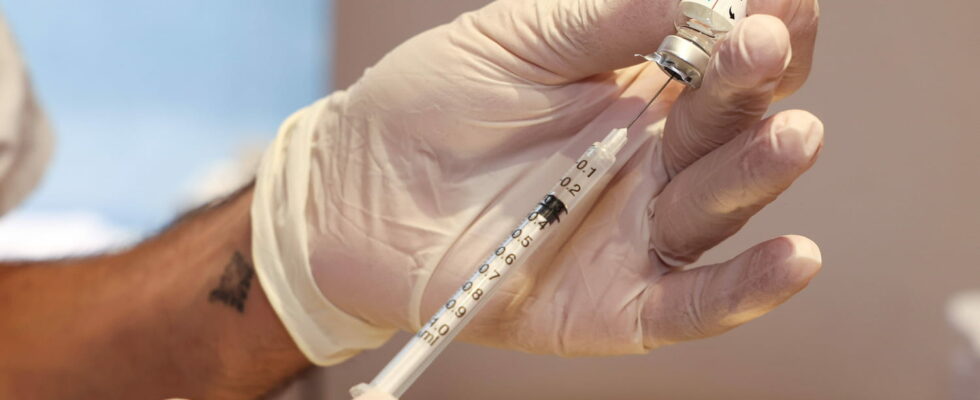Present on French territory for two years, monkeypox (MPOX) has already affected nearly 5,000 people. However, a new, more contagious variant has just appeared in Europe.
Is France prepared for the return of monkeypox to its territory? Since the resurgence of cases of monkeypox around the world, first in Africa, then in Asia and now in Europe, the possibility of the infection spreading in France is very much conceivable. On August 14, the World Health Organization (WHO) triggered its highest level of alert and, the next day, a first case of the new clade 1b variant was discovered in Sweden in a person who had traveled to Africa, where the number of infected people is increasing.
With the arrival of this variant of the mpox virus, “there is a strong chance that sporadic cases” and new cases of monkeypox “will appear, and probably soon, in France” estimated the resigning Minister Delegate for Health, Frédéric Valletoux in the columns of the Tribune Sunday. He recalled, however, that “so far no [cas lié à ce variant n’a été découvert en France]”.
No lockdown, but preventive measures
While the WHO is warning against the spread of this new variant of monkeypox, its director for the European zone, Hans Kluge, assured during a press briefing of the UN agencies that “mpox is not the new covid”. The painful memory of the global Covid-19 epidemic is still fresh in the collective mind, including in France. The resigning Prime Minister, Gabriel Attal, has therefore taken measures without considering measures as strict as during the covid period. He announced the placement of the French health system in a “state of maximum vigilance” and has spoken with Catherine Vautrin, Minister of Labor, and Frédéric Valletoux, Delegate for Health, on several occasions since August 16, 2024. The Minister Delegate for Health has since ruled out the idea of a new lockdown.
On the other hand, “new information and recommendation measures” for people traveling to risk areas will be put in place, Gabriel Attal said. The head of government also contacted the health authorities so that they could decide on “updating the recommendations [de vaccinations] on target populations” and asks “the Regional Health Agencies to relay the most recent information and health recommendations to health structures and professionals and to associations linked to at-risk populations”.
Treatments and vaccines available in France?
There is a treatment already used against the previous strain of monkeypox that spread to France in 2022. This treatment, a vaccine produced by the Danish group Bavarian Nordic – the only pharmaceutical laboratory to have a vaccine approved by the health authorities against monkeypox – should be just as effective against the new variant of monkeypox according to experts.
If it turns out that an individual is infected with MPOX in France, they will be able to get tested by their doctor using a PCR test before being taken into care and treated. In a press release dated August 19, the Pasteur Institute said it was ready to “test and vaccinate patients at the request of the authorities”. It should be noted, however, that the Bavarian Nordic vaccine can only be administered to adults, with the exception of pregnant women. Regarding the quantity of vaccine doses available in France, the resigning minister Frédéric Valletoux assured in the Sunday Tribune have “robust stocks that allow for an appropriate response. We have more than in 2022 and we can order more quickly if necessary”. Vaccination must also continue to be implemented among “the most exposed public”. The health authorities confirm the minister’s comments and Gabriel Attal assured that part of the available vaccine doses would be made available to African countries, where health resources are lacking. The European Union and the United States will do the same.
Read also
Several cases of monkeypox in France
In 2022, nearly 5,000 cases of monkeypox (MPOX) had been detected, but these were infections linked to another strain (clade 2). To deal with this, 152,500 vaccinations had been carried out throughout the territory. In 2023 and 2024, several cases of this same variant had also been detected, to a lesser extent.
The difference with this new mpox epidemic is that the new clade 1b variant has been judged to be more contagious and more virulent than the strain previously detected in France. “We know that clade 1 is more dangerous than clade 2,” explained WHO spokesman Tarik Jasarevic from Geneva. The new variant of the disease is responsible for more serious symptoms, including generalized rashes all over the body and not concentrated on the genital areas, on the face or on the hands and feet as in most cases. The mortality rate of the clade 1 variant of monkeypox is estimated by scientists at 3.6%, reports AFP.
In addition to being more serious, this variant seems to transmit more according to Dr. Catherine Smallwood, from the WHO European office, quoted by BFMTV : “This appears to be a strain of the virus that circulates exclusively within the human population, and some of the viral changes that virologists have identified tell us that it is likely to transmit more efficiently between humans.”
What is the origin of monkeypox?
The monkeypox epidemic began, according to the World Health Organization, with patient zero infected by “eating undercooked meat from infected animals.” This infectious disease is transmitted primarily by rodents to animals, some of which can be eaten by humans.
As for the geographical origin of monkeypox, the WHO indicates that the disease originated in Central and West Africa. Known since the 1970s, this disease usually tends to develop in tropical areas. Seeing it develop in countries that do not have this climate is a surprise to scientists.
